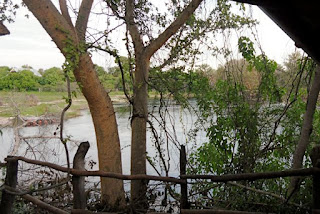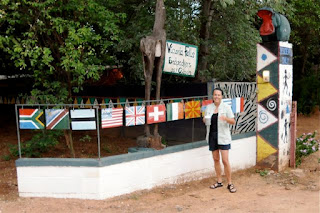A few postcard entries, to greet the new year, and a Happy New Year's wish to our families, friends, and followers!
 |
| Delta waters, mosquito-laden, outside our tent |
Red Zone: "Are you taking?" That's the question at the Old Bridge Backpacker's Camp in Botswana, situated on the southern edge of the Okavango Delta, one of the world's largest inland deltas. It's late December, the rains have been falling in the north in Angola, and the deltas are pulsating with bird life, animal life, and, yes, mosquitos. Here, in the Delta, rainy season waters end their southward flow, dribbling into meandering streams and trickles before evaporating out on the huge salt pans to the south. This is malaria country, to one person, the "Red Zone," and apart from road accidents, malaria is the biggest risk to a land traveler in north Botswana. As this was a last-minute visit for us, we had not seen a doctor to get a prescription for prophylactic anti-malaria medicines, which, in any case, have non-trivial side effects. In fact, we had consciously opted against anti-malarials in Indonesia. But here, in the so-called Red Zone, surrounded by stagnant fresh water, the risk seemed much higher than when anchored off a dry island on our boat. We were not "taking." Instead, we were slathering ourselves in 40% DEET cream, and hoping for the best. After a few days, with buzzing sounds in our ears, and in a nervous state of constant vigilance, we decided the risk was too great, and we packed up and headed south, away from the Red Zone. Next time, we will plan ahead, and answer "yes" to the question: "Are you taking?"
 |
| Waiting for the bus, outside our hostel in Victoria Falls |
Tribes: My travels as a young adult tended to be on sailboats, where you live on a boat, or crash on someone else's. Thus, it wasn't until our trip to Vietnam last year that I stayed in a hostel. The rooms are cheap, generally clean, and typically located within walking distance of the main attractions. More importantly, though, they tend to be inhabited by people whose values and lifestyles are similar to those of a cruising sailor. Years ago, my friend Mark referred to people who share these attributes as members of a tribe, and the moniker seems apt for the sailing/hostel crowd: we are members of the hostel tribe. Earlier this year, in Sydney, and now here, in Zimbabwe and Botswana, we stayed in several hostels and again, enjoyed the ambience, interaction with fellow travelers, and amenities -- common kitchen, common lounge areas, etc. They can be a bit noisy in the late evening hours, but for the most part, when traveling in new places, we're happier sleeping amongst our tribe than we are in a sterile hotel room in a sanitized section of a strange city.
 |
| A donkey cart on a highway with a 120 kph speed limit. |
Road Hazards: It's pretty clear to me and Jennifer that the most dangerous thing we've done on our sailing trip is driving the roads in South Africa and Botswna. The "main" highways are typically only two lanes, undivided, lack shoulders, and are filled with trucks and cars each driving the speed limit of 120 km/hour, or about 75 mph. Those factors in and of themselves might not be bad enough, but then you need to know that many of those on the road are relatively inexperienced drivers ... driving cars of questionable heritage and upkeep. The "official" radio station in South Africa, SA-FM, was all over the story that over 1100 South Africans had been killed on the nation's roads in December alone. That's an annualized rate of over 24,000 deaths -- 2/3 of the US figure, even though South Africa's population is only 1/6 of the US population, with far fewer roads and far fewer miles driven. It doesn't help that South Africans often share the road with cattle and donkeys, or that the number of cars, trucks, and drivers is growing much faster than the road infrastructure. We'll be glad to be back at sea, where it's safe -- and there are far fewer donkey carts.
 |
| Circles and strands of barbed wire, atop a wall |
Fences: When we arrived in Richards Bay, we were immediately struck by the degree to which white South Africans relied on fences for residential security. Not just any fences, but sophisticated barriers of steel-tipped, razor-wired, electrified contraptions that defy unauthorized entry. At the game parks, fences again were prominent, this time to keep the wild animals inside the reserve and away from local cattle grazing grounds. In the
veld, villagers also deploy fences -- to keep the livestock in at night, and thus protected from predation. Even in the townships, fences demarcate one shack from another, and the brick dwellings from the tin-walled dwellings. Fences are big in South Africa, but a few days ago, on our way to the American consulate to get some additional pages in my passport, we saw the quintessential paradox: on one side of the road, a correctional institution, well-fenced in, with the expected walls and barbed wire, and on the other side of the road, a fancy golf course, whose fence was plainly more secure than the prison's fence -- higher walls, a dozen electrified wires, and sharper tips on the fence posts. Two fences. One to keep the inmates in, the other to keep the proletariat out. Welcome to South Africa, so to speak.








No comments:
Post a Comment